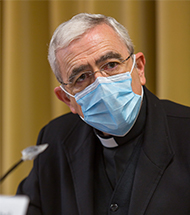An expert from the University of Navarra assures that 'Fratelli tutti' constitutes "a revolutionary principle for the social-ethical and legal order".
Ramiro Pellitero states that this encyclical is presented in a way that is open to everyone's interests and problems and in a language that is easy to understand.

"Fratelli Tutti constitutes a revolutionary principle for the social-ethical and juridical order". This was affirmed by Ramiro Pellitero, professor at the University of Navarra, during a conference at roundtable held at the School of Theology on the occasion of the publication of the latest encyclical of Pope Francis. Professors Pedro Benítez and Rodrigo Muñoz also took part.
Professor Pellitero recalled that "much of the content and the very language of this social encyclical is presented in an open way, based on the interests and problems of all and with language that is easy to understand".
He also emphasized that in carrying it out, the Pope was inspired especially by St. Francis of Assisi and also by many other people, including non-Christians. Furthermore, he said that the first foundation of the solutions offered by this pastoral letter is anthropological and ethical, but that at the same time these solutions find a fullness in the Christian faith fully lived.
He pointed out that Francis underlines the responsibility that everyone, as men and women, has towards others: "He proposes not only a Church going out, but a humanity going out postcool, because the pandemic has highlighted social problems at all levels".
<i>Fratelli tutti</i>: “Una propuesta vigorosa, desafiante y arriesgada”Fratelli tutti elaborates a moral or social proposal of general value, as is characteristic of the social doctrine of the Church. It is a vigorous, challenging and risky proposal , because it is launched 'into the arena' knowing that some will not agree with agreement with certain things, but trying to help for the common good, since the evangelizing mission statement of the Church is associated with human promotion", he explained.
During his exhibition he also recalled some of the encyclical's concrete proposals on individualism, the use of digital technologies, migrants, care for the earth, the culture of life, private property, and religious freedom.
Before concluding, he emphasized the importance of not neglecting or hiding the problems included in the text, once the analyses and proposals have been made. Nor should they be left to be solved by mere self-interest or the temptation of "comfort, an easy path for those who perhaps have their needs sufficiently solved".




